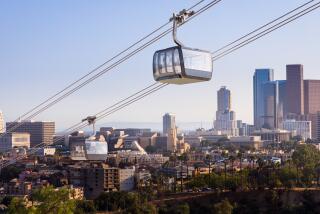L.A. lawmakers try to sell NFL stadium plan to colleagues
Reporting from Sacramento -- As Anschutz Entertainment Group and its myriad backers roam the halls of the state Capitol crafting a last-minute bill to help pave the way for a football stadium in downtown Los Angeles, they face what is a perennial problem in Sacramento: Nobody likes L.A.
Not legislators from Northern California, many of whom are dyed-in-the-Gore-Tex environmentalists whose constituents will probably never attend a football game in the metropolis to the south.
And not the lawmakers from more neighborly San Diego County, who worry that an L.A. football stadium would allow the City of Angels to poach their Chargers.
Most of the L.A. political delegation and power structure is behind AEG’s proposal to require an expedited process for any legal challenges to its $1.2-billion stadium. But it is how the Angelenos will woo the rest of the state that will make a difference.
“Why are we doing it for this one instance?” asked state Sen. Juan Vargas (D-San Diego), a Chargers fan. “Why not do it for a lot of projects that are large and will bring a lot of jobs? And why didn’t we get [the bill] earlier? Why wasn’t this done a month ago, two months ago, so people could get a chance to look at it?”
A final bill was being frantically drafted Thursday evening, with just five more business days before the end of the legislative session. According to several sources, the measure by Sen. Alex Padilla (D-Pacoima) would allow legal challenges to the stadium’s environmental impact report to be heard immediately in the state court of appeals, which would have between 150 and 175 days to rule. That would avoid protracted litigation.
In exchange, AEG would pledge to build a carbon-neutral stadium with more public transit users than any other stadium in the country.
Environmentalists gave a tentative thumbs-up to the idea, with David Pettit, a senior attorney for the Natural Resources Defense Council, saying Thursday evening that a 175-day timetable was “in the ballpark.”
AEG’s push to get special treatment was spurred by a 2009 vote to grant a complete environmental waiver to a competing stadium proposal by Majestic Realty in the City of Industry. Some Northern California lawmakers still feel burned by voting for that exception, which passed only after business leaders promised thousands of jobs.
“I haven’t seen one job yet,” said Sen. Mark DeSaulnier (D-Concord). “To a large degree, I regret that vote, and I don’t want to do that again.”
DeSaulnier said he was concerned by AEG’s plan to gut an existing bill on an unrelated subject, insert language on the stadium and fast-track it through the Legislature.
“My problem is process,” he said. “I don’t like gut-and-amends.”
The regional differences were apparent at a Thursday news conference on regulatory reform.
Senate President Pro Tem Darrell Steinberg (D-Sacramento) was noncommittal when asked whether there should be an exemption for the stadium.
When Assembly Speaker John A. Pérez, a Democrat from Los Angeles, cut in: “The senator is coming with me to the first game in the new football stadium,” Steinberg issued what seemed a pointed reminder. “That’s the most environmentally friendly football stadium, with the finest traffic mitigation in the country,” he replied, laughing.
AEG officials have told lawmakers that their stadium would create more than 10,000 jobs for the state’s slumping economy and that failure to pass legislation by Sept. 9 would jeopardize the project.
AEG officials were accompanied on visits to lawmakers’ offices Thursday by business and union leaders, including Maria Elena Durazo, who heads the Los Angeles County Federation of Labor.
“We’re making our case for good jobs in Los Angeles,” Durazo said. “We’re telling them there is enormous urgency.”
Durazo said the special legal protections for the stadium are needed to avert protracted environmental litigation. “We can’t have delays that are going to take away the very real possibility of creating jobs.”
Los Angeles legislators with strong environmental credentials also were pushing for the bill. “Under expedited judicial review, we can bring jobs to this community while building a carbon-neutral stadium that will prioritize transit more than any other NFL stadium,” said Assemblyman Bob Blumenfield (D-Woodland Hills).
The bill has opposition from many fronts south of the Grapevine. Majestic has its own crew of lobbyists meeting with legislators. The firm announced Thursday that its project has been endorsed by Teamsters Joint Council 42 in the San Gabriel Valley.
And though Chargers officials vow to keep the team in San Diego, legislators like Vargas are wary of giving Los Angeles an edge.
“Are they going to take the Chargers?” he asked. “I’d like to know that. It makes a bit of a difference.”
More to Read
The biggest entertainment stories
Get our big stories about Hollywood, film, television, music, arts, culture and more right in your inbox as soon as they publish.
You may occasionally receive promotional content from the Los Angeles Times.







